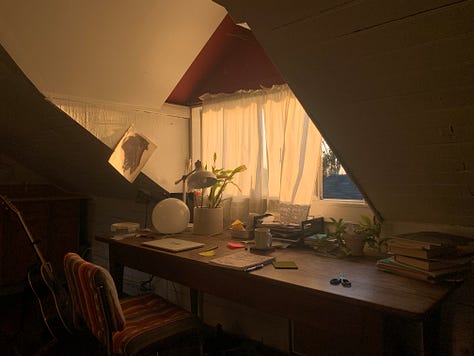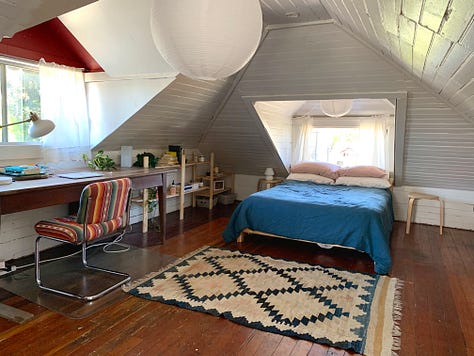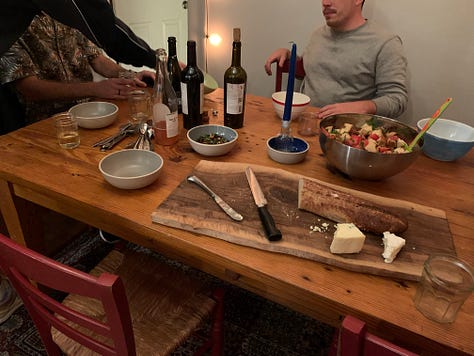More than a year ago, my friend and former housemate E asked me when she would read the essay about the dissolution of Ward Street. I have tried several times to write it, like I have tried, or perhaps not tried hard enough, to write every other thing I have meant to write this year. This time, I’m doing it.
Nearly three years ago, in Boston, I was sitting at a makeshift plywood desk, working what felt like a makeshift plywood job, and scrolling Craigslist. I was looking for housing in Berkeley, where I would go to journalism school in a matter of months. I had, to my mortification, already gotten scammed out of the first apartment I tried to secure. I thought I’d learned some lesson about lunging for a California dream too good to be true, and I scrolled more cautiously now. But then, on my screen, there it was: the actual California dream. An airy, attic room with a not-quite-up-to-code private bath and dodgy roof access with views of the San Francisco Bay and the Berkeley Hills. I emailed immediately. When they responded saying I could move in, I thought I’d won the lottery.
I rolled up to that house on Ward Street a few months later. Two men, my new housemates, answered the door, one wearing red crocs, the other, clogs. They hugged me as a cat scampered across the porch. “Is it okay if your cat goes outside?” I asked, racking my brain for when in their emails they’d mentioned a cat. The man in crocs, H, laughed — a big grin on his face — and said, “We don’t have a cat.” Then they both picked up my stuff and hauled it through the purple front door.
Two flights up, in the airy attic, I began to set up my new home. The attic room was long, the roof so sloped that you could stand up straight only while walking in the very center, down the length. My sister was helping me move, and we arranged trinkets and plants on the shelves a previous roommate had built. A long desk faced west, and gold poured in when the sun sank in the afternoon. The bathroom was carpeted (weird) and the shower’s ceiling slanted so steeply I had to squat to get myself clean (suboptimal). But through the bathroom, a hatch door opened to the roof and my sister and I stepped into a panoramic view of the East Bay kissing the water, a bridge stretching into San Francisco. I posted photos of my new room and a high school friend commented, “this looks like a place one could thrive in.”
On the main floor, flanked by a narrow hallway of coats, a red cow painting, a print of a tree stump, and a mountain of shoes (hiking, running, fashion), the kitchen was the heart of the home. I liked sitting at the counter, between whoever was cooking at the stove, and whoever was sitting at the sturdy kitchen table. Plants grew everywhere. Art made by friends and ex-lovers hung next to art scavenged from estate sales. The decor felt eclectic, charming, cohesive and functional — my roommates had built shelves, a drying rack, and picture frames wherever they were needed.
Throughout the house, there were no screens on the windows, and the lines between in and out of doors blurred. The sun poured onto every surface and a flow of friends, girlfriends, former housemates, band members, cousins (so many cousins) filtered through our home — everyone seemed to have a key to the front door, which made the space feel lively and somehow safer than any alternative. E, with her shock of bleach-blonde hair (matching mine, also blonde then), moved into the fourth room a month later. Our home was full.









There were a lot of house logistics we hadn’t covered at the outset, but the default mode was one of sharing. Admittedly, it took me a beat to get used to. H would bring home Ikea bags filled with overstock from the food bank where he worked, and we’d refer to the 10-pound bag of rice or the infinite olive oil as “bank,” meaning collective. (Bank food occasionally got confused with a coveted pint of Ben & Jerry’s, but it was ultimately all a wash.) Other times, J, who wore the clogs in that first meeting, would come back from the grocery store — swinging through as the last shopper minutes before it closed — and pour a bowl of chips for whoever was sitting at the counter, and we’d chomp and chat while he expertly rolled out little meatballs that would also, inevitably, be shared. Beers, too, were often opened and poured around into small glasses, so you could always join in for just a sip, and you were never sure how much you had drunk.
Art, salvaged redwood, mugs, furniture, drills, a vacuum, even cars (in a game of musical parking spots and keys — once, my only Honda key had to be mailed back to me from the mountains), passed easily between neighbors and friends. All of it, facilitated and effortlessly modeled by a buoyant network of people who opened their generous circle to me. The first weekend I lived in that house, my housemates and their friends took me to a backyard music show near Lake Merritt, and we sat on warm pavement in the afternoon listening and gabbing during breaks, passing a warming beer around. That same weekend, friends poured into our kitchen and sat for hours at our dining table eating panzanella and chilled cauliflower soup.
The house had a constant soundtrack. J and H were in a band, and, E, though not in a band, played guitar. Everyone was noodling or harmonizing, jumping into whatever song was already being made. Or if there was no music yet, H would walk into the house singing out in his distinctive, slightly nasal, full-throated voice. I had barely started learning guitar and was so shy of how I played that for the first few weeks, I’d strum only when the house was empty. I grew braver, but barely and slowly, so intimidated and awed by the musicians in my house, their friends who would swing through for band practice and pick up the many stringed instruments that filled the broom closet.
A month and a half after moving in, my roommates and their friends, still becoming mine, drove us into the Marin headlands. We dropped down cliffy steps to spread our blankets over Black Sands Beach. We played board games and lounged. The weather was hot that day, convincing everyone the Pacific was refreshing, not frigid. Someone, a stranger, had waded too deep in the water to retrieve a football, then started panicking — drowning before our eyes. One of our group, a former lifeguard, noticed first and sprang up from our sandy game of codenames and ran into the water. He and H carried the struggling man onto the sand and another friend, a nurse, ran to his side, tending to him until she was sure he was okay.
This group was so capable and quick to act, to know what to do in terror. And then, once the danger had passed, they took it in stride with ease, grins. We climbed back to the beach parking lot and someone, maybe H, guided us through a human cinnamon roll: everyone held hands in a long chain, and the person at one end began turning their body inward, wrapping the line into a cinnamon swirl with the first person at the center. Everyone on the outside squeezed.
At home, we lived independent lives. Sometimes our schedules just touched at the edges. E rose early to nanny, came home late after working at a bar. I was sleeping deeper and longer than I had since childhood and was often the last riser; I’d shuffle onto the kitchen linoleum in my falling-apart slippers to drink the coffee my housemates had left me in the Moka pot. Some nights, our lives aligned perfectly and we made cold noodle salad on a rare, oppressively hot summer night. We watched movies, a projector set up on a kitchen stool, casting its light just above the drum set. We hosted sprawling backyard parties that spilled indoors, up two flights and out the roof, and stretched into the dark until the neighbors yelled out their window that it was after 2, which it was. The remaining party guests burned one last cigarette, then went to bed.
So much community orbited the Ward Street house — an East Bay gravitational center growing in mass for years. H had been the first of us to move to the Bay Area and had been building a friend group (and its quirky lore) since then. When I first moved in, I learned of the DIY backyard sauna, the crazy brainchild of a former housemate, an architect, who had come into a pile of free reclaimed redwood, and another friend who had studied stove design. It was a match made in heaven, until the sauna caught fire due to an unextinguished ember. J woke up in the night to flames outside his second-story window and the fire department on the way (the house was, miraculously, untouched). There was the roof deck, once expanded to twice the size I knew, before a neighbor tattled and it was dismantled. Another week, my housemates tore up the horrifying living room carpet and found hardwood floors, which they refinished themselves. Every project seemed (naively?) possible with a small army of friends. And each home improvement project was begun without landlord consent, since we were violating our lease.
The attic — with the truncated shower I squatted in to clean myself for more than a year, the low ceilings I routinely banged my head on, the windows on every face, the bathroom skylight that warmed the floor — was never agreed upon to house anyone. In a perfect storm, our landlady, an 80-something Berkeley tycoon who owned some 20 properties, found out I was living there. She gave me 24 hours to leave — or she’d lock me out of the room containing all my belongings. In front of my housemates, I wept. We called lawyers. We served her a cease and desist. Then we packed backpacks and drove to Yosemite for the weekend.
When we got back, we began moving out. Dismantled the space filled with rooster art made of beans, stools from the Alameda flea market, owl plates from a relative — things my roommates had acquired and set up before I got there, then invited me to enjoy and live among. I leaked tears onto boxes as we packed, sputtering stray droplets onto things I had no material desire for, yet felt attached to because they were part of the home that connected me to such a radiant, crammed-full-to-bursting life.
There was no perfect next option for all of us, certainly not at the bargain price we’d been paying. In my Berkeley solar system, Ward Street was the center of gravity. It created so many of our orbits. Then suddenly, it lost its force. We each went flying off in a different direction. My grief felt out of proportion — no one had even left the East Bay — so I kept my sadness mostly private, mourning the change of having felt so held from the moment Berkeley became my home, and then feeling suddenly untethered.
I’d moved only blocks away and could reach my roommates with a quick bike ride. Yet every one of my patterns felt disrupted. I missed our daily patter over coffee. The crosswords. The second floor smoker’s porch and the metal pulley system full of Simpler Times beer. The surprise drop ins. The roof. The pile of shoes by the front door. J, H, E.
A few months after moving out of Ward Street and still reeling, I hosted a party in my new house. The atmosphere was warm and easy, with so many people from my multiple circles converging. Once everyone had left, and the after-party loneliness set in like damp, I noticed a scrap of paper on my dresser: a blank page torn from the back of my journal. I had a flash of mortification, then annoyance that brushed on anger at the fact that someone might have leafed through my private thoughts. And then – relief to see that the person who had torn that page, and written on it, was H. One of the few people in the world I trust would not have — did not — read it. He had left his signature scratch-off lotto ticket and the message: “Congrats. I’m so glad we found you.”
H left the Bay recently. Before he did, he invited friends to one last dinner at a restaurant in Oakland’s Jack London Square. It was a festive, raucous evening lubricated by dirty gin martinis, and later, Hamm’s and whiskey. At the end of dinner, we each went around the table and pulled lotto tickets from our pockets, presenting them to H, who proceeded to feverishly scratch off the silvery layer obscuring his winnings — which he then shared. “$50!” he shouted after finishing one ticket, telling us we’d see that reduction on the dinner bill. We left the restaurant tablecloth covered in shavings.
At a New Year’s trip north on the California coast, one friend remarked she’s an idea generator but not a leader, at least when it comes to activities. “I’m neither,” H had said. Which is funny, because this whole thing, the fact of us being together, was his idea. He’d been the first to move to Berkeley: bartending and drumming up friends. And then, he did what so few are capable of: he pulled a community together and simply stepped back with no ego, let friendships develop with him, around him, because of him — without expectation.
After we’d moved out of Ward Street, we came back for one last night of furious cleaning, an effort to prevent our landlady from claiming one more penny from us. What felt like nearly everyone I’d met in that house showed up to scrub its walls and floors and get accidentally woozy from bleach, then eat pizza on the front porch. When the kitchen linoleum looked whiter, if not sparkling (the floor could have used that treatment while we lived there), we all trudged up to the attic, my old room, ducking our heads through the bathroom, and popping out onto the roof deck. The air was clear and still warm with the residual heat of summer. E pulled out a pack of Parliaments and passed them around, the lighter following around the circle. I watched, living inside the end of a Sharon Olds poem:
then they all lit cigarettes, and the
red, glowing ends burned like the
tiny campfires we lit at night
back at the beginning of the world.
All of us huddled around for a few quiet, gorgeous moments, our bodies still. And then, almost in ceremony, each was extinguished. We walked downstairs for the last time, and departed into the dark, toward, and away from, home.



Your DNA and spirit with thrive forever in the Ward Street House. Great story.
Such a treasure! Had me thinking back to my own little versions of Ward Street. 🤗